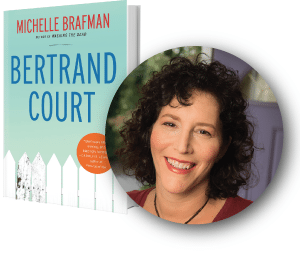By Michelle Brafman
I have a bad case of book club envy. None of my dozen or so ex-book clubs exist any longer. I was in my mid-twenties when I joined my first—back when I was living in a cockroach-infested group house on Capitol Hill. We started with My Traitor’s Heart by Rian Milan and only selected important books that triggered important conversations about our important entry-level jobs. We lasted six months until, one by one, each member moved away from Washington, D.C., except for me.
In my mid-thirties, our Mommy and Me group met throughout the course of a year to discuss popular books with some heft, like Middlesex and Balzac and the Little Chinese Seamstress. Instead, we shared tips on storing pumped breast milk and getting our babies to sleep. And how can I forget the one that got away? Two mothers, two preteen daughters, and we read only Newberry award winners.
After mourning the dissipation of my last book club, I made peace with the fact that this was an experience I’d have to live without. Not so. Dozens of book clubs have invited me to talk about my book club-friendly novels. I never say no.
I’ve mastered Google maps, so I can navigate my way to the outer reaches of the Washington, D.C. metro area and have Skyped with book groups in Boynton Beach, Chicago, Birmingham, and elsewhere. The hosts write me warm notes and buy me bottles of wine or nice smelling soaps. I’m the one who should be thanking them.
My books were published by a wonderful indie press, but I must rely heavily on word of mouth buzz to build my readership. A professional book group leader once told me that readers will get excited about a book after meeting the author, even if they were lukewarm about the read. Excitement begets more readers.
But it’s more than that. Talking in depth to smart people who have carefully dissected my narrative has taught me a good deal about my book and writing in general. Sometimes readers break off into smaller groups and use the stories as mirrors to reflect on their own relationships. They eviscerate my characters and their bad choices. I’ve butted in to defend my beloved peeps, but I learn more if I don’t. I’d also hoped for this hot back and forth, proof that readers can engage with a character, even if they don’t necessarily want to go shoe shopping with him or her.
I’m fascinated by the mechanics of book clubs. I want to know what the group read last, what they will read next, and how they pick their books. Yes, it’s true. There are lots of folks out there who are reading! But better yet, they’re clearing a night a month, no easy feat, to talk and debate end engage wholeheartedly in the stories we offer. I want to know how the members met and how long they’ve stayed together. I am always moved by their intimacy, the way they’ve supported one another through illnesses, deaths, divorces, and various life challenges. I want to slip right into their shared history and current closeness.
Many book clubs have, in fact, invited me to join their group. For a moment, I’ve considered accepting. But then I remember that I’m bad luck, that I always pick the final book a group reads before it dies. Perhaps as a writer, I’m most comfortable on the periphery, half in the mix, half taking notes for later. The lucky chance to sit with these bibliophiles for a few hours, however, restores my belief in friendship, literature, community, and the intersection of all three. This is the next best thing to belonging to a book club itself.

MICHELLE BRAFMAN is the author of the novel Washing the Dead and Bertrand Court, a collection of linked stories. Her work has appeared in Slate, the Los Angeles Review of Books, LitHub, The Nervous Breakdown, Tablet, Lilith, and elsewhere. She teaches at the Johns Hopkins MA in Writing Program and lives in Glen Echo, Maryland, with her husband and two children. Visit her website.

